Coordinación
Una coordinación sólida puede evitar vacíos y duplicaciones en las respuestas humanitarias, así como garantizar que los PTM complementen otros tipos de asistencia. Sin embargo, el informe del «Estado Global de los Programas de Transferencias Monetarias» de la CALP Network muestra que la coordinación de la asistencia en efectivo es vista como débil y ad hoc, y que esto está teniendo graves repercusiones operativas.
Los donantes, las ONG y los líderes de los grupos de trabajo de transferencias monetarias (GTM) han pedido claridad sobre tres temas principales relacionados con la coordinación de la asistencia en efectivo:
- Quién debe ser responsable de asegurar una coordinación eficaz de la asistencia en efectivo;
- Cuál es la función y el mandato de los grupos de trabajo de transferencias monetarias, incluso en relación con las transferencias monetarias multipropósito;
- Cómo se debe dotar de recursos a la coordinación de asistencia en efectivo.
Tenemos que basarnos urgentemente en lo que funciona y proporcionar claridad a nivel mundial sobre las preguntas arriba mencionadas, adaptándonos a los diferentes contextos. Hace mucho tiempo que se deberían haber tomado decisiones claras basadas en necesidades operativas y no en la política de las agencias.
Prioridades actuales
El objetivo de la CALP Network es contribuir a seguir progresando en este tema en tres niveles: apoyar a los grupos de trabajo de transferencias monetarias a nivel regional; contribuir a soluciones prácticas para la coordinación de la asistencia en efectivo a nivel mundial; y convocar una discusión basada en la evidencia sobre temas clave, destacando puntos de decisión críticos y oportunidades de progreso.
Contenido destacado

Cash Coordination Tip Sheet
Guidelines and Tools
This tip sheet sets out established best practice, key guidance and resources for all aspects of cash coordination, intended as a clear, accessible and action-oriented guide for those engaged in coordination of cash and voucher assistance (CVA) at the field level.

Introducing the Cash Coordination Tip Sheet
Webinar
The CALP Network has developed a tipsheet setting out established best practice and key guidance and resources for all aspects of cash coordination, intended as a clear, accessible and action-oriented guide for those engaged in coordination of cash and voucher assistance at the field level.

Cash Coordination: A proposal from members in MENA
Blog Post
Earlier this year the CALP Network undertook regional consultations to explore options for cash coordination. This blog lays out recommendations from participants from the Middle East and North Africa who sketched out what cash coordination, and coordination more broadly, could look like in future to support a more effective, efficient and accountable response.
Últimos recursos

Overview: Rapid Assessment of Markets (RAM)
Report
The Rapid Assessment for Markets (RAM) provides a quick and basic snapshot of how key markets operate immediately after a shock, to support initial decision on feasibility of response options (cash vs in-kind, initial market support) and to identify whether or not more detailed market system analysis is...
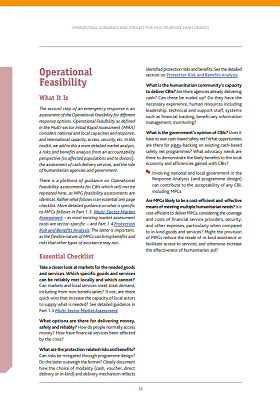
Operational Guidance And Toolkit For Multipurpose Cash Grants: Operational Feasibility
Guidelines and Tools
Operational Feasibility as defined in the Multi-sector Initial Rapid Assessment (MIRA) considers national and local capacities and response,
and international capacity, access, security, etc. In this toolkit, we add to this a more detailed market analysis, a risks and benefits analysis from an...
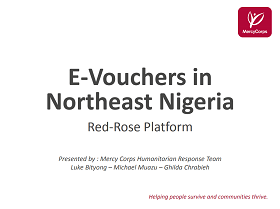
E-Vouchers in Northeast Nigeria
Report
OVERVIEW OF RED ROSE PLATFORM
DECISION TO USE IT. WHY?
The urgency of rapidly responding to the urgent food security needs of
vulnerable households in Northeast Nigeria displaced by conflict while
supporting the rapid recovery of small businesses in the food market
chain.
The importance of fostering...
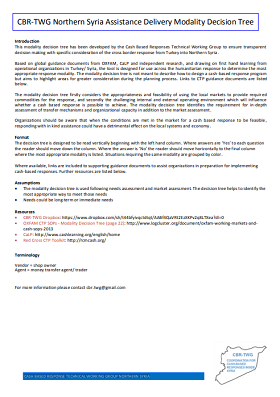
CBR-TWG Northern Syria Assistance Delivery Modality Decision Tree
Report
This modality decision tree has been developed by the Cash Based Responses Technical Working Group to ensure transparent decision making with specific consideration of the cross border response from Turkey into Northern Syria. Based on global guidance documents from OXFAM, the CALP Network and independent...

Lessons Learned for Nepal Earthquake Response
Report
The aim of this product is to improve the performance of humanitarian actors in the response of the Nepal earthquake, assist agencies working in the response and encourage positive action by decision makers. The lessons learned, stated in this document, have been a product of the analysis of main findings...
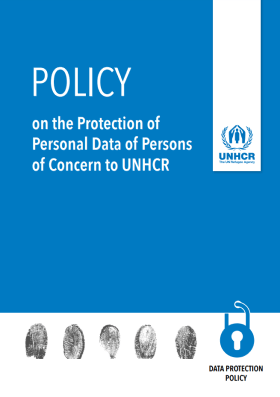
Policy on the Protection of Personal Data of Persons of Concern to UNHCR
Policy paper
This Policy lays down the rules and principles relating to the processing of personal data of persons of concern to UNHCR. Its purpose is to ensure that UNHCR processes personal data in a way that is consistent with the 1990 United Nations General Assembly’s Guidelines for the Regulation of Computerized...

Challenges and the State of Play of Interoperability in Cash Transfer Programming
Guidelines and Tools
This study explores the factors driving the design of interoperability for Cash Transfer Programming. It outlines the rapidly changing environment in which digital services are emerging, the types of digital collaborations that could be enabled, and the key design challenges that confront effective...

Research on Food Assistance for Nutritional Impact (REFANI): Literature review
Report
The REFANI literature review identifies existing evidence on the use of Cash Transfer Programmes (CTPs) and the impact of CTPs on acute malnutrition in humanitarian contexts. The review is structured as follows: Section A discusses the global burden of acute malnutrition; Section B highlights...

Strengthening Markets in Crisis
Presentation
All around the world, people depend on markets for their lives and livelihoods. But what happens to these markets when an emergency occurs? This video explains the concept behind cash, voucher and market assistance, which is rapidly becoming a modality of choice for humanitarian programmes engaged in...
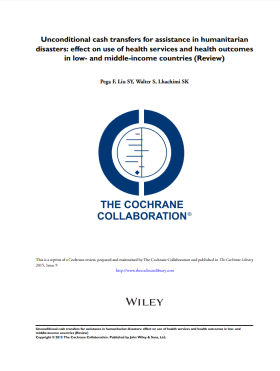
Unconditional Cash Transfers for Assistance in Humanitarian Disasters: Effect on use of health services and health outcomes in low- and middle-income countries
Report
Unconditional cash transfers (UCTs) for humanitarian assistance during disasters may improve health in low- and middle-income countries (LMICs) by giving recipients additional income. This study sought to assess the effect of UCTs on health services use, health outcomes, social determinants of health,...
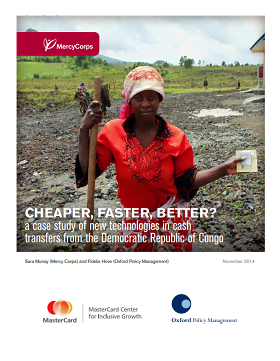
Cheaper, Faster, Better? A case study of new technologies in cash transfers from the Democratic Republic of Congo
Report
Over the past decade, there has been a growing consensus in the humanitarian community that cash, as compared to in-kind aid, is the best form of assistance to provide during an emergency. For families that have been displaced by a crisis or natural disaster, cash offers aid recipients more flexibility...
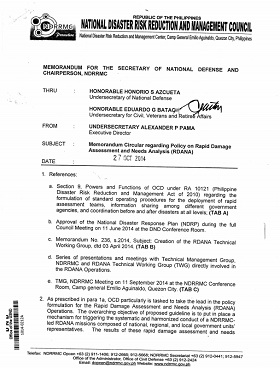
National Disaster Risk Reduction And Management Council
Report

Cash Transfer and Community Resilience Programming in South Central Somalia
Blog Post
The Building Resilience in Central Somalia (BRCiS) attempts to provide immediate humanitarian assistance as well as developing longer term local capacity through a combination of locally adapted cash-for-work and unconditional cash transfers.
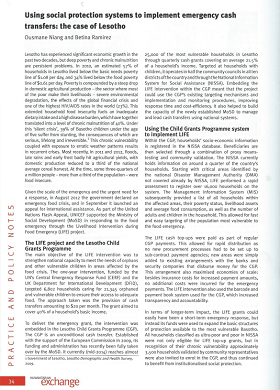
Using Social Protection Systems to Implement Emergency Cash Transfers: The case of Lesotho
Case Study
Lesotho has experienced significant economic growth in the past two decades, but deep poverty and chronic malnutrition are persistent problems. Given the scale of the emergency and the urgent need for a response, in August 2012 the government declared an emergency food crisis, and in September it...

Cash Transfers: Progress made but challenges remain
Blog Post
In five years cash programming has come from almost nowhere to being – for some donors at least – the preferred option, especially in the field of food and nutrition. “We no long measure food aid contributions in wheat/tons equivalent,” says Julia Stewart-David of the EU aid body, ECHO. “That...

USAID Procurement Executive’s Bulletin 2014-06
Policy paper
This Bulletin applies to USAID’s Acquisition Workforce consisting of Contracting Officers (COs), Agreement Officers (AOs), Negotiators, CO/AO Representatives (CORs/AORs), and Activity Managers worldwide. The purpose of this bulletin is to provide guidance to the Acquisition Workforce on promoting...

Annex B: Lebanon Case Study
Report
Cash and vouchers are increasingly provided as assistance to people affected by disaster and crisis. Studies and evaluations have firmly established that cash transfers can be an appropriate alternative or complement to in-kind assistance. Whilst some evidence exists on the Value for Money (VfM) of...

Mobile Cash Transfers for Urban Refugees in Niamey, Niger
Report
This study compared the effectiveness of cash transfers delivered through mobile phone and microfinance institutions to urban refugees in Niamey. The study found that the mobile phone delivery mechanism could be more cost-efficient than the MFI mechanism, after initial set up costs associated to...
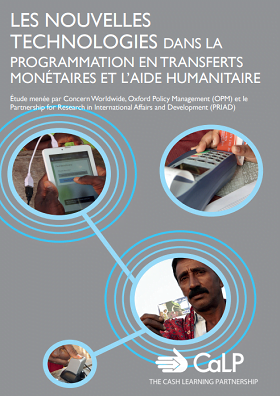
Les nouvelles technologies dans la programmation en transferts monétaires et l’aide humanitaire
Report
Le CALP Network a chargé Concern Worldwide de diriger un consortium également constitué d’Oxford Policy Management (OPM) et de Partnership for Research in International Affairs and Development (PRIAD) afin d’analyser l’utilisation actuelle des nouvelles technologies appliquées aux programmes...
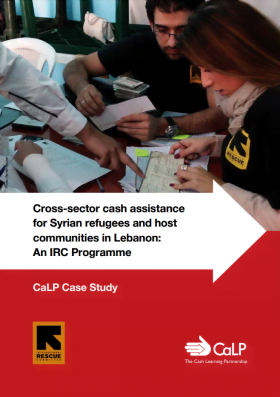
Cross-Sector Cash Assistance for Syrian Refugees and Host Communities in Lebanon: An IRC Programme
Report
Since January 2013, the International Rescue Committee (IRC) has been implementing a project providing humanitarian assistance to the Syrian refugees in Lebanon. This project provided unconditional financial assistance to targeted Syrian refugees and Lebanese host households to help them be better...